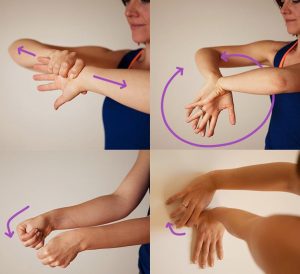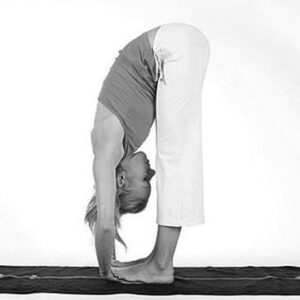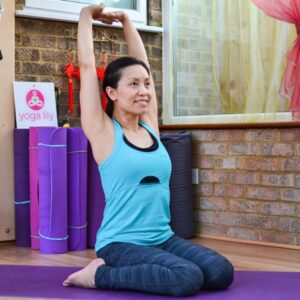How to do Eka Hasta Bhujasana, Elephant’s Trunk Pose (One Hand Over Arm Balance)
Yoga classes in Milton Keynes
Eka Hasta Bhujasana – Having one leg extend away creates a heavy weight for the arms to lift. The Elephant’s Trunk Pose (One Hand Over Arm Balance) develops strength in the wrists, arms, and shoulders. It also requires a great deal of abdominal strength.
1. Sit in seated staff posture. Helped by the right hand, draw the right knee up and catch the right foot with the left hand. Bring the right knee back as far behind the right shoulder as possible, keeping the knee bent so that the right foot is above the left knee.

2. Place the right hand on the floor beside the right hip, with the fingers pointing forward and the arm inside the right knee.
2. Place the right hand on the floor beside the right hip, with the fingers pointing forward and the arm inside the right knee. Place the left hand on the floor beside the left hip with the fingers pointing straight ahead.The key is to press the right calf strongly down against the arm, as if you were trying to squash the upper arm. With the elbows bent but not locked, press both hands strongly into the floor and lift the whole body up. Keep the left leg straight. Have it parallel to the floor, or if possible, lift it higher. Press the right leg against the arm to prevent it from slipping down. Then stretch out the toes of both legs. Stay for five breaths all more with even breathing.

2. With the elbows bent but not locked, press both hands strongly into the floor and lift the whole body up.
3. Exhale, lower the body down to the floor, release the right leg and straighten it, then repeat on the other side for the same length of time.
Tips
Gaze: Tip of nose
Build Up Poses:
- Downward Facing Dog Pose
- Arm Pressure Balance
- Boat Pose
Counter Poses:
- Wrist Releases
- Mountain Pose 2 (from Hero Pose)
- Forearm Releasing Forward Fold
Lighten:
- Leave on left foot on the floor, only lifting the buttocks off the floor
- Place the hands on blocks
Effect: Strengthening
Beginner’s Tip
It takes a little time to build up the core strength required to lift the extended foot from the floor. Try using a block under the extended foot or two blocks under your hands.
Eka Hasta Bhujasana, Elephant’s Trunk Pose Counter Poses
In yoga we use a counter pose in a sequence; For example, a twist follows a backbend to “neutralise” the spine, or a forward bend follows a backbend to help lengthen the spine and calm the nervous system.







